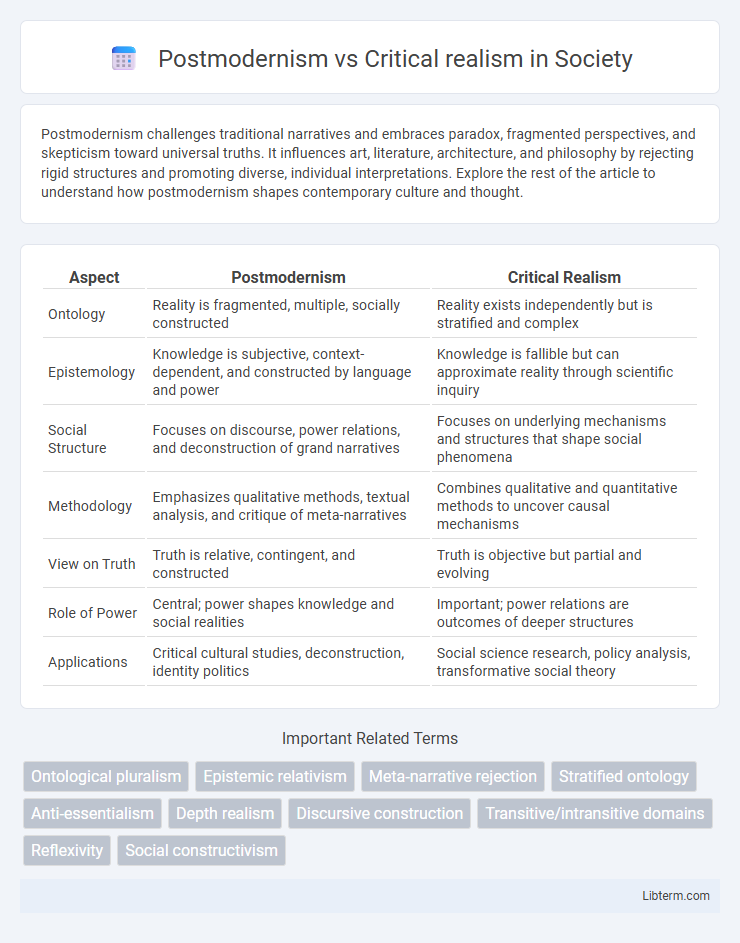Postmodernism challenges traditional narratives and embraces paradox, fragmented perspectives, and skepticism toward universal truths. It influences art, literature, architecture, and philosophy by rejecting rigid structures and promoting diverse, individual interpretations. Explore the rest of the article to understand how postmodernism shapes contemporary culture and thought.
Table of Comparison
| Aspect | Postmodernism | Critical Realism |
|---|---|---|
| Ontology | Reality is fragmented, multiple, socially constructed | Reality exists independently but is stratified and complex |
| Epistemology | Knowledge is subjective, context-dependent, and constructed by language and power | Knowledge is fallible but can approximate reality through scientific inquiry |
| Social Structure | Focuses on discourse, power relations, and deconstruction of grand narratives | Focuses on underlying mechanisms and structures that shape social phenomena |
| Methodology | Emphasizes qualitative methods, textual analysis, and critique of meta-narratives | Combines qualitative and quantitative methods to uncover causal mechanisms |
| View on Truth | Truth is relative, contingent, and constructed | Truth is objective but partial and evolving |
| Role of Power | Central; power shapes knowledge and social realities | Important; power relations are outcomes of deeper structures |
| Applications | Critical cultural studies, deconstruction, identity politics | Social science research, policy analysis, transformative social theory |
Defining Postmodernism
Postmodernism critiques grand narratives and universal truths, emphasizing relativism, fragmentation, and the subjective nature of reality. It challenges objective knowledge by highlighting the influence of language, power structures, and social constructs on meaning. This perspective contrasts with Critical realism, which accepts an underlying reality independent of perception while recognizing the limits of human knowledge.
Understanding Critical Realism
Critical realism, developed by philosopher Roy Bhaskar, asserts that reality exists independently of human perceptions but can be only imperfectly understood through social science. Unlike postmodernism, which often emphasizes relativism and skepticism about objective truth, critical realism combines a realist ontology with a constructivist epistemology, acknowledging the layered nature of social phenomena. This approach prioritizes uncovering underlying causal mechanisms and structures beyond observable events to explain complex social realities.
Historical Origins and Influences
Postmodernism emerged in the mid-20th century as a reaction against Enlightenment ideas and modernist certainty, drawing on thinkers like Foucault and Derrida who emphasized social constructs and power relations in shaping reality. Critical realism, developed by Roy Bhaskar in the 1970s, originated from a synthesis of positivist and interpretivist traditions, emphasizing an objective reality structured by causal mechanisms beyond mere perceptions. Both movements critique positivism but differ in their epistemological stances, with postmodernism often rejecting meta-narratives and critical realism advocating for a stratified ontology to explain social phenomena.
Key Philosophical Assumptions
Postmodernism rejects the notion of objective reality, emphasizing the subjective construction of knowledge through language, culture, and power dynamics, while critical realism asserts the existence of a reality independent of human perception but recognizes that our understanding is fallible and socially mediated. Postmodernism challenges grand narratives and universal truths, arguing that reality is fragmented and plural, whereas critical realism maintains ontological realism paired with epistemological relativism, allowing for a stratified reality composed of the empirical, actual, and real. The philosophical divergence centers on postmodern skepticism towards metanarratives and critical realism's commitment to a transitive epistemology where scientific inquiry progressively uncovers underlying structures and mechanisms.
Epistemology: Knowledge and Truth
Postmodernism challenges the notion of objective knowledge and absolute truth, emphasizing the relativity and social construction of all knowledge claims. Critical realism maintains that while our understanding is fallible and theory-laden, there exists a reality independent of human perceptions that can be progressively known through scientific inquiry. The epistemological tension between these perspectives revolves around the limits of certainty and the potential for transsubjective knowledge about causation and structures in the natural and social worlds.
Ontology: Reality and Representation
Postmodernism challenges the notion of a fixed, objective reality, arguing that reality is socially constructed and fragmented through language, culture, and power relations, making representation inherently subjective and pluralistic. Critical realism posits a stratified ontology where an independent reality exists, but our knowledge of it is mediated by perceptions and social contexts, emphasizing the distinction between the real, actual, and empirical domains. Both perspectives interrogate the relationship between reality and representation but diverge on the existence of an objective reality beyond human interpretation.
Methodological Implications
Postmodernism challenges the objectivity of knowledge by emphasizing the subjective construction of reality, leading to qualitative methods that highlight multiple perspectives and narrative forms. Critical realism advocates for a stratified ontology, combining empirical observation with a deeper understanding of underlying causal mechanisms through mixed methods, integrating both quantitative and qualitative approaches. This divergence influences research design, with postmodernism prioritizing interpretive analysis and critical realism emphasizing explanatory frameworks to uncover structural causes.
Critiques of Postmodernism
Postmodernism faces critique for its relativism, undermining objective knowledge and making it difficult to establish universal truths. Critics argue that its deconstruction of meta-narratives leads to skepticism and nihilism, weakening social and political critique. In contrast, critical realism emphasizes the existence of an objective reality independent of perceptions, aiming to reconcile empirical observation with deeper causal mechanisms.
Critiques of Critical Realism
Critical Realism faces critiques from Postmodernism primarily for its assertion of an objective reality independent of human perception, which Postmodernists argue overlooks the social construction of knowledge and power dynamics. Critics also challenge Critical Realism's reliance on causal mechanisms, suggesting it inadequately addresses the fluidity and contingency inherent in social phenomena. Furthermore, its claims of stratified reality are viewed as overly rigid, limiting the interpretive flexibility emphasized in Postmodernist perspectives.
Practical Applications and Contemporary Relevance
Postmodernism challenges meta-narratives and emphasizes subjective interpretations, influencing fields like cultural studies and art by promoting diversity and deconstruction of established norms. Critical realism, grounded in a realist ontology and interpretivist epistemology, informs social sciences and policy-making by advocating for the identification of underlying structures and mechanisms shaping social phenomena. Both frameworks maintain contemporary relevance by guiding researchers and practitioners in addressing complexity, power dynamics, and context-specific realities within disciplines such as sociology, education, and organizational studies.
Postmodernism Infographic

 libterm.com
libterm.com